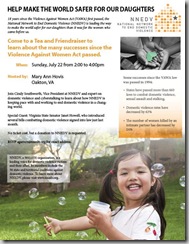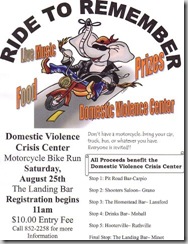By: Marci Manley, KARK 4 News
Updated: July 16, 2012
Video Available on original article
"Since I left a domestic violence relationship in March, it's been really hard," she said, reading from the screen.
Dana has been searching for support in Little Rock after leaving an abusive relationship that lasted two and a half years.
"I still have nightmares every night, and I'm scared, she said. "I'm always looking around. If my children run up on me, wanting to play, I jump."
Finding a support group of women, outside of a shelter living situation, has been tough. Dana believed deciding to leave the abuse behind would have been the hardest part.
"Once you've made that decision, it's not over. It's important to leave, but it's also important to have support once you've left, instead of people saying here's a phone number and you falling through the cracks. That's what I felt like happened to me," she said. "Every time I would call the numbers, it was the same thing that support groups were only available to those residing in the shelter facilities."
Instead of giving up, Dana checked out. A book that is, written by another survivor. Mildred Muhammad is the ex-wife of the man known as the D.C. Sniper. Before his 10-person killing spree, his violence began in their home.
"I checked out the book and there were a lot of things in there I could identify with," Dana said. "Ms. Muhammad's email was in the book, and I decided to write her."
That memoir marked a turning point. Dana never expected a response, from Mildred Muhammad. But she got one.
"She sent my email to someone else, and my phone started ringing almost instantly last week.," Dana said.
"It's been difficult to get victims in touch with resources, and here recently it seems to have gotten more difficult," said Community Outreach Coordinator Meredith Looney of Women and Children First. "There are so many shelters that offer so many services, sometimes there's confusion."
Domestic violence organizations like hers know getting the right information to survivors can be a challenge, especially with staff turnovers.
"We do have staff turnover and we train the best we can, but if someone forgets that we have outreach programs for people who don't stay at our shelter, they might tell someone that. Then, that creates confusion," Looney said. "But we do have those resources and we do want survivors to be able to use them."
Women and Children First offers an whole host of support groups held throughout the week.
"They can be really comforting," Looney said. "Getting into these groups allows you to plug yourself into the reality that you're not the only one, you're not stuck."
"You still feel embarrassed, ashamed, and lonely," Dana said. "And I think being with a group of survivors who have been there would be good for me. Understanding how they're coping, and what they are going through. I don't want to feel alone."
After four months, Dana is plugged into the Women and Children First's program, and she's hoping other women find the help to heal as well.
"I needed help, and I'm sure there are other women in that situation who called," Dana said. "Hopefully they'll know the support is there."
To see the complete list of support groups offered by Women and Children First, click here.






